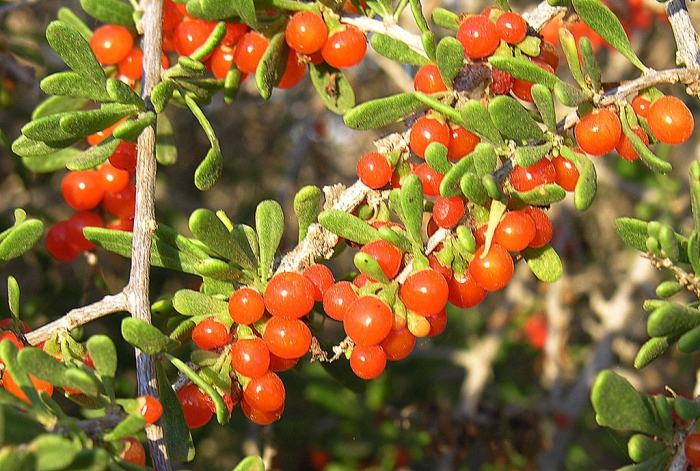Baja Desert-Thorn
(Lycium brevipes)
Baja Desert-Thorn (Lycium brevipes)
/
/

Dick Culbert
CC BY 2.0
Image By:
Dick Culbert
Recorded By:
Copyright:
CC BY 2.0
Copyright Notice:
Photo by: Dick Culbert | License Type: CC BY 2.0 | License URL: https://creativecommons.org/licenses/by-sa/2.0/ | Uploader: Dick Culbert | Publisher: Flickr |
































Estimated Native Range
Summary
Lycium brevipes, commonly known as Baja Desert-Thorn, is an evergreen shrub native to the coastal sage scrub and chaparral of California, as well as the desert regions of Northwestern Mexico. This shrub can reach up to 4 meters (13 ft) in height and is characterized by its bushy, spreading habit with long, thorny, tangled branches. The branches bear small, fleshy green leaves up to 1.5 centimeters (0.59 in) long, which are coated with glandular hairs. From late winter to early spring, it produces an inflorescence of small clusters of tubular flowers, each about 1–2 centimeters (0.39–0.79 in) long, including the calyx of sepals at the base. The corolla is funnel-shaped, lavender to nearly white, with 2 to 6 lobes at the mouth, and the protruding stamens and style are notable features. The fruit is a bright red, spherical berry approximately a centimeter wide, containing many seeds, which are attractive to birds.
Baja Desert-Thorn is valued for its drought tolerance and ability to thrive in the challenging conditions of arid landscapes, making it a suitable choice for xeriscaping and wildlife gardens. It is often used for erosion control and as a barrier plant due to its thorny branches. In cultivation, it requires full sun exposure and can tolerate a range of soil types, provided they have good drainage. While it is adapted to dry conditions, moderate watering will encourage more lush growth and flowering. Gardeners should be cautious of its thorny branches when planting in areas with pedestrian traffic.CC BY-SA 4.0
Baja Desert-Thorn is valued for its drought tolerance and ability to thrive in the challenging conditions of arid landscapes, making it a suitable choice for xeriscaping and wildlife gardens. It is often used for erosion control and as a barrier plant due to its thorny branches. In cultivation, it requires full sun exposure and can tolerate a range of soil types, provided they have good drainage. While it is adapted to dry conditions, moderate watering will encourage more lush growth and flowering. Gardeners should be cautious of its thorny branches when planting in areas with pedestrian traffic.CC BY-SA 4.0
Plant Description
- Plant Type: Shrub
- Height: 8-12 feet
- Width: 8-12 feet
- Growth Rate: Moderate
- Flower Color: Purple
- Flowering Season: Spring, Winter
- Leaf Retention: Evergreen
Growth Requirements
- Sun: Full Sun
- Water: Medium
- Drainage: Medium, Fast
Common Uses
Bee Garden, Bird Garden, Butterfly Garden, Hummingbird Garden, Low Maintenance
Natural Habitat
Native to coastal sage scrub and chaparral of California and desert regions of Northwestern Mexico
Other Names
Common Names: Box Thorn
Scientific Names: , Lycium brevipes, Lycium brevipes var. brevipes, Lycium richii, Lycium verrucosum, Lycium berlandieri var. brevipes,
GBIF Accepted Name: Lycium brevipes Benth.